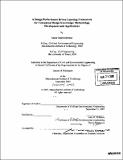A design performance driven learning framework for conceptual design knowledge : methodology development and applications
Author(s)
Chaiworawitkul, Sakda, 1977-
DownloadFull printable version (28.69Mb)
Other Contributors
Massachusetts Institute of Technology. Dept. of Civil and Environmental Engineering.
Advisor
John R. Williams.
Terms of use
Metadata
Show full item recordAbstract
This thesis develops a learning framework for automation of acquisition of bridge conceptual design knowledge. The thesis proposes a new learning methodology explicitly aimed at capturing quality design aspects to help engineer gain insight into good design. The research uses the National Bridge Inventory (NBI) data, which contains more than 600,000 bridges. The physical condition ratings are used as proxies for design quality. In this data the relationships between physical condition ratings and bridge design elements are not well-known. The simultaneous equation model (SEM) technique is employed to model the physical condition ratings. SEM has the advantage over existing methods of state transition probability estimation in that no a-priori subjective conditional grouping is required. The resulting model yields the marginal effects of design variables on condition ratings, which is easy for engineers to interpret. The analysis results reveal that design features available in the NBI database alone do not adequately explain the resulting condition ratings. Using the identified performance model, COBWEB, an incremental clustering algorithm, is employed to learn mappings from design specification to configuration space. However, the COBWEB branching strategy focuses on probabilistic predictability of feature values. The learned knowledge therefore represents not clusters of good design aspects but rather clusters of local similarity. A modification to the existing strategy is proposed. A set of experiments has been conducted to compare the original and the modified COBWEB. Finally, the thesis provides a detailed discussion of issues related to the quality of the NBI database and proposes strategies for improved analysis of the NBI bridge data.
Description
Thesis (Ph. D.)--Massachusetts Institute of Technology, Dept. of Civil and Environmental Engineering, February 2008. Pages 169 and 170 blank. Includes bibliographical references (p. 165-167).
Date issued
2008Department
Massachusetts Institute of Technology. Department of Civil and Environmental EngineeringPublisher
Massachusetts Institute of Technology
Keywords
Civil and Environmental Engineering.